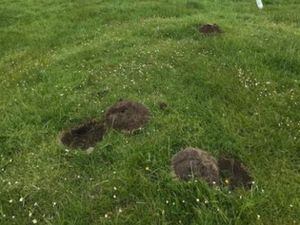Metal detectorists sentenced after damaging historic fort
Dunadd Fort in Argyll and Bute is renowned as a royal power centre of the Gaelic kings of Dal Riata, from around AD 500 to AD 800.

Two metal detectorists who damaged a protected fort dating to the Iron Age have been sentenced to unpaid work in the community.
Andrejs Grisulis, 35, and Matthew Madden, 55, carried out illegal metal detecting and removed an artefact from Dunadd Fort, to the north of Lochgilphead, Argyll and Bute, in June 2020.
They previously admitted heritage offences when they appeared at Dunoon Sheriff Court last month.
At the same court on Thursday, they were each given a community payback order requiring them to carry out 80 hours of unpaid work and be subject to supervision for six months.

Following a complaint and a subsequent investigation by Historic Environment Scotland (HSE), 28 holes were found at the site and police recovered an extremely fragile iron hammerhead.
HES said the mound was used as a fort more than 2,000 years ago and the site is internationally renowned as a royal power centre of the Gaelic kings of Dal Riata, from about AD 500 to AD 800.
Anne Marie Hicks, assistant procurator fiscal for north Strathclyde, said following the sentencing: “Dunadd Fort is of great significance to our Scottish heritage and the local community. It is a nationally important scheduled monument subject to legal protection.
“It is vitally important that there are laws in place to protect such important sites, and as with this case where there is sufficient evidence of a crime and if it is appropriate and in the public interest to do so, we will prosecute.”

The court also granted the prosecution motion for the metal detector to be forfeited.
Under the Ancient Monuments and Archaeological Areas Act 1979, it is an offence to use a metal detector or carry out unauthorised works on a scheduled monument without consent from the relevant authorities.
Dunadd was taken into state care in 1932 in recognition of its national importance and of the formative role that it played in the establishment of the Scottish nation.





